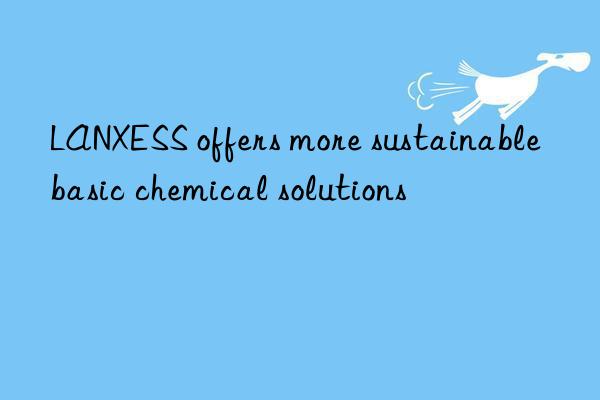
- Polyols and oxidation product portfolio further expanded
- Product upgrades with a lower carbon footprint
- Product expansion with Scopeblue sustainability label
Specialty chemicals company LANXESS has taken an important step towards greater sustainability for its polyols and oxygenates portfolio: the High Quality Industrial Intermediates (AII) business unit can now supply around 80% of its polyols and oxygenates ( POP) portfolio provides more sustainable solutions. Seven of the business unit's nine products, including trimethylolpropane (TMP), adipic acid (ADA), 1,6-hexanediol (HDO) and phthalic anhydride (PSA), have been Successfully completed LANXESS internal Scopeblue certification. At the same time, other products will soon follow this process.
Dr. Stephan Deutsch, Global Head of the LANXESS POP Business Line: "For customers, LANXESS becomes one of the first manufacturers to offer both conventional products and products with a low carbon footprint. What sustainability itself means for the chemical industry is now It is no longer limited to a single target. Similar to LANXESS, about half of our customers have set themselves fixed climate targets for the next few years,” continues Deutsch. "As such, we are certain that Scopeblue will present us with an unprecedented and significant opportunity in the market."
For LANXESS, we use the Scopeblue brand label to indicate that more than 50 percent recycled raw materials are used in our products, or that the carbon footprint of the product is less than half that of conventional comparable products. To demonstrate the use of sustainable raw materials along the entire value chain, the LANXESS production facility in Krefeld-Uerdingen has been successfully certified by TÜV Nord according to the internationally recognized ISCC Plus sustainability standard.
Powerful Sustainable Products
The new sustainable product TMP Scopeblue is produced using approximately 54% bio-based n-butyraldehyde produced from biogas and guarantees the same performance as conventional products. "We have already produced the first batch of TMP Scopeblue for one of our largest customers. In the meantime, several other companies have expressed strong interest in this product. We are also in communication." LANXESS TCM (Trimethylolpropane , calcium formate and maleic anhydride) said Dr. Maria Guixà, Global Market Manager. "Given the wide range of applications of our products, for example, TMP can be used in the production of coatings, resins, UV-curable coatings and polyurethanes and related fields, so we can foresee a huge potential."
Competitive Advantage
For example, Scopeblue upgrades for adipic acid and 1,6-hexanediol are based on bio-based or bio-recycled cyclohexane production. As a result, these products have a significantly higher carbon footprint than conventionally produced products. “As early as 2021, the carbon footprint of our product portfolio will not only be certified for the first time, but also additionally Create higher added value for our customers.” Thanks to the effective decomposition of nitric oxide by the two nitric oxide removal devices in the LANXESS adipic acid plant during the production process, LANXESS The emissions produced in the production process of the products are significantly lower than the similar level in the market. "By using bio-based raw materials, we have the ability to further fulfill customer demands for more sustainable products and even CO2-neutral products," says Berhorst.
open up new opportunities
Raw materials play a vital role in improving the carbon footprint of POP-related products. Eric Hendricks, Sustainability Manager, POP Business Line, also emphasizes this point. Therefore, LANXESS is working on replacing more raw materials with green raw materials. "Although so far there has not been a solution that can completely replace all raw materials." Hendricks said. "In this field, we are also working together with partners in the entire industry chain, so that we, as the supply side, can also give a clear and definite position as soon as possible."
At present, although the demand for POP sustainable products mainly comes from Europe. However, LANXESS also sees great potential in the Asian and American markets, as competitors in these regions have so far not offered any green alternative solutions in their product portfolios. "We definitely look forward to being a step ahead in the field of sustainability," concludes Deutsch. "In the next few years, there will be an increasing demand for innovative and sustainable products in the market. And if we bring the latest and most cutting-edge products to the market, we can believe that our products will be with our customers in the future. Together we have a wealth of new opportunities.”



 微信扫一扫打赏
微信扫一扫打赏
